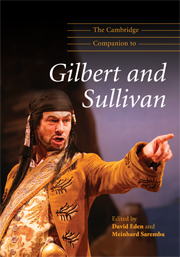Book contents
- Frontmatter
- Part I Background
- Part II Focus
- Part III Reception
- Part IV Into the twenty-first century
- 16 Adventures in musical detection: scholarship, editions, productions and the future of the Savoy operas
- Appendix 1 Who wrote the overtures?
- Appendix 2 Stage and choral works by Arthur Sullivan and W. S. Gilbert
- Appendix 3 Modern editions of works by Arthur Sullivan and W. S. Gilbert
- Appendix 4 Sullivan's archetypes of English opera
- Notes
- Bibliography and further reading
- Index
- Plate section
16 - Adventures in musical detection: scholarship, editions, productions and the future of the Savoy operas
from Part IV - Into the twenty-first century
Published online by Cambridge University Press: 28 September 2011
- Frontmatter
- Part I Background
- Part II Focus
- Part III Reception
- Part IV Into the twenty-first century
- 16 Adventures in musical detection: scholarship, editions, productions and the future of the Savoy operas
- Appendix 1 Who wrote the overtures?
- Appendix 2 Stage and choral works by Arthur Sullivan and W. S. Gilbert
- Appendix 3 Modern editions of works by Arthur Sullivan and W. S. Gilbert
- Appendix 4 Sullivan's archetypes of English opera
- Notes
- Bibliography and further reading
- Index
- Plate section
Summary
Pursuing post-graduate research into the comic operas of Arthur Sullivan was, in 1975, considered in some academic quarters as frivolous, if not virtually a contradiction of terms. I was fortunate, however, in having been delivered into safe hands. The Professor of Music at the University College of Wales at Aberystwyth, Ian Parrott, was himself a pioneering Sullivan scholar – a perceptive article by him on Sullivan had appeared in Music and Letters as early as 1942.With the additional support of Sullivan's biographer, Percy Young, one of the department's external examiners, a provisional title was accepted for a PhD thesis: ‘The Theatre Music of Arthur Sullivan’. Broadened beyond the comic operas so that it could include the music written for the (respectable) Shakespeare plays, the subject was accepted.
Investigation
To get inside the music, though, it was essential to study it in full score. These had been published for some of the Shakespearean music, such as The Tempest, Henry VIII and The Merchant of Venice, and for Ivanhoe. Copies, however, were collectors’ rarities; but rarer still were the three comic opera full scores published in Germany during Sullivan's lifetime: the Bosworth editions of The Mikado and the Zell and Genée adaptation of The Yeomen of the Guard (Der Königsgardist), and Litolff's German version of HMS Pinafore (Amor an Bord). Examining these required a trip to the British Library. Fortunately, however, the university library had acquired a copy of the facsimile of the autograph full score of The Mikado issued by Gregg International Publishers Limited in 1968. Beautifully produced, this was to have been followed by a facsimile of the Iolanthe autograph with a preface by Ian Parrott but, alas, this never appeared.
- Type
- Chapter
- Information
- The Cambridge Companion to Gilbert and Sullivan , pp. 229 - 242Publisher: Cambridge University PressPrint publication year: 2009



